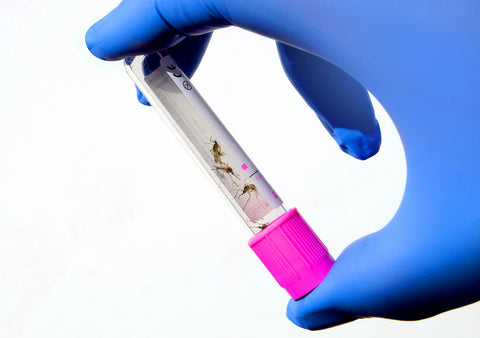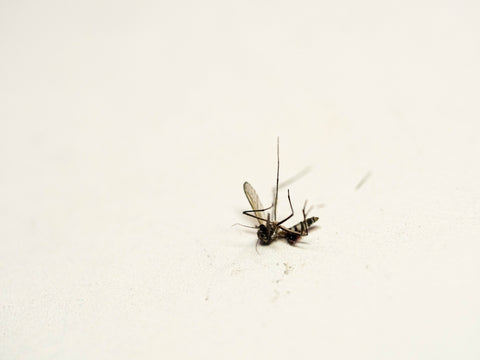You’ve tried every form of natural mosquito control – and a few less natural methods – that you can think of.
At times, you’ve even resorted to wandering around the house with a mosquito swatter hoping that you’ll be able to take the pests out of the skies.
But none of it’s working, or at least those measures aren’t working as well as you’d hoped.
So, you heard online to do more research into a potential mosquito killer and you come across something that you haven’t tried yet – vinegar.
Some will tell you that keeping a good source of vinegar in the house means you have everything you need to make a natural mosquito repellent for yard and in-home usage.
But is that really true?
Read on to discover how powerful some types of vinegar can be as repellents and how to use it – alongside other mosquito products – to control the pests in and around your home.

Vinegar and Mosquitoes – What Does the Science Say?
The science related to vinegar and mosquitoes is interesting as it appears to display that some types of vinegar have a repellent effect, though how powerful that effect is depends on the concentration of vinegar used.
For instance, a study published in Entomological Research examined the repellent effects of wood vinegar – a supposed “superfood” found in many organic stores – on two mosquito species. The researchers took a simple approach to the study.
They doused their arms in solutions containing various concentrations of vinegar before placing their exposed arms into cages containing mosquitoes.
The study found that wood vinegar achieves a repellent effect up to 100% when the solution contains 80% vinegar to 20% water.
However, the repellent effect wears off as less vinegar is used, with a 5% concentration only achieving repellency of 39.6% - solid, but it still means that over 60% of mosquitoes would happily bite an arm that has such a low concentration of vinegar on it.

A more recent study, published in Malaria Journal in 2023, examined apple cider vinegar.
That study made an interesting conclusion, too, as it found that apple cider vinegar can be both a mosquito attractant and a mosquito repellent.
Specifically, when used at low enough concentrations, this type of vinegar drew mosquitoes in, similar to a mosquito lamp, which could potentially set the stage for the creation of traps.
However, the vinegar is likely less reliable in this aspect than a sugar trap would be. It’s more powerful as a repellent, as a high concentration of apple cider vinegar appears to be an odorant that mosquitoes can detect and are likely to try to escape.
Finally, there’s also an interesting study used as a science project at the 2008 California State Science Fair to consider.
In that study, a student tested various forms of all-natural mosquito control – including cinnamon, citric acid, and apple cider vinegar – to see if they effectively killed mosquito larvae.
In the case of the vinegar, a solution containing 85% water and 15% apple cider vinegar was able to kill 15 mosquito larvae in a container within 18 hours, but that wasn’t the case when the vinegar was diluted to 5% concentration.
So, the science is clear – certain types of vinegar act as mosquito repellents and, in the case of apple cider vinegar, can be used to destroy mosquito larvae with the appropriate concentration.

Why Does Vinegar Work?
When it comes to larvae, it’s clear why mosquitoes hate vinegar. It kills their young.
That makes apple cider vinegar – again, used in the appropriate concentration – usable as an effective mosquito killer, outdoor and in, when tackling the bugs’ juvenile offspring.
But what about the repellent effect?
It likely comes down to the interesting way that mosquitoes taste things. Like most other animals, mosquitoes have taste receptors on their tongues.
When they try to pierce skin that’s covered in vinegar, they’re likely going to fly away before sucking out any blood because the vinegar activates those taste receptors to deliver an unpleasant sensation to the bug.
But even more interestingly, you’ll find that mosquitoes actively avoid landing on areas that are coated in vinegar before their tongues come into play.
The reason being, mosquitoes also have taste receptors on their feet. In essence, the bug can taste its prey before it ever takes a bite, with the receptors likely acting as a way to tell mosquitoes if the thing they landed on is edible.
Combine that with their olfactory sensors – located on the antenna, near the mouth, and in the proboscis the bugs use to drink – and it’s clear that vinegar can overwhelm a mosquito’s senses to the point where they can’t stand to be around it.
And that’s why mosquitoes hate vinegar – it tastes awful to them to the point where they’ll actively avoid anything that smells or tastes like the substance.
How to Use Vinegar to Get Rid of Mosquitoes
Given that vinegar can both serve as a repellent and, in some cases, an attractant to mosquitoes, several possibilities open up in terms of how to use it as a form of mosquito control.
Sprays and traps both work, with the following ideas being useful.

Create a Mosquito Indoor Repellent Spray
Creating a spray is one of the easiest ways to use vinegar to keep mosquitoes away. It’s simple, too.
Grab an empty spray bottle and fill it with a ration of three parts water to every one part of white vinegar. That gives the spray a 25% concentration – powerful enough to ward off mosquitoes without being so powerful that it creates an odor that’s as unattractive to you as it is to the mosquito.
You can also add a touch of dish soap to the mix, which helps the solution adhere to whatever surface you spray.
As for where to use it, the spray is at its best indoors when used on plants. It’s not an indoor mosquito killer – the vinegar concentration isn’t quite high enough to destroy adult mosquitoes – but it’ll keep mosquitoes away from areas where they normally congregate.
You could also try using the spray as mosquito control for yard work, though it works better when applied directly to you than it would on the plants in your yard.
Create a Mosquito Trap
If a spray isn’t doing enough to keep mosquitoes away, why not try a real mosquito killer for yard work – the vinegar-based mosquito trap?
These traps work a lot like the mosquito lamps that use a special light to draw the bugs in before zapping them to death.
However, you won’t need a power source (or a mosquito light) as you’ll be using the attractive power of dish soap to draw the mosquito in so it’s destroyed by apple cider vinegar.
Grab a plastic bottle and slice off the top so that you have a piece you can turn upside down to use as a funnel.
Before placing that funnel into the now-open bottle, add one part dish soap to three parts apple cider vinegar to the bottle. Invert the top half and pop it back in – securing it in place with tape or glue – and wait.
The combination of apple cider vinegar and dish soap creates an attractive odor, with mosquitoes crawling through your funnel to get to the liquid inside.
Once there, the soap sticks to their wings to make it difficult for them to mistake while the high concentration of vinegar inside the bottle eventually kills them.
Hang your bottles on tree branches and similarly high places to ensure the odor emitted by the solution inside has the best chance to spread throughout your yard.

Use Mosquito Stickers
By this point, you’re probably feeling like the mosquito guy.
You have two methods of using vinegar, one to attract and the other to repel, that both do a great job of keeping the bugs out of your house and yard.
Your final option is to use a mosquito deterrent that’s been around for a long time – stickers.
The idea with these stickers is that they emit a scent that mosquitoes find unattractive, leading to them buzzing away. Typically, the stickers emit citronella, though you may be able to find some that have a vinegary odor.
Unfortunately, these stickers are tough to make at home, meaning you’ll likely have to buy them from a company.
But as a backup to the other methods for using vinegar as a mosquito deterrent, they’re easy to use and can be placed almost anywhere in the home.
Supplement Your Homemade Vinegar Solutions with the TNT Mosquito Destroyer
The science shows us that several types of vinegar are effective at keeping mosquitoes at bay, so there’s no reason not to use it around your home.
Concocting a spray using white vinegar, water, and a little dish soap is the simplest way to do that.
It allows you to douse anything you wish without worrying about the chemicals inside the spray.
But what if you want more protection, especially in your yard? Vinegar traps may work to an extent, but their range is limited. For better results, check out Tougher Than Tom’s Mosquito TNT.
By combining warm water with the provided bait, these traps work in the same way as vinegar traps, only they’re much more effective.
With each transmitting its odor in a 1-acre radius, you can put the four you receive up in each corner of your yard to keep mosquitoes away for months at a time.
Try it today – along with your vinegar solutions – to take an all-natural approach to repelling mosquitoes.


